How a Cancer Survivor Built His Body Back Up with Kettlebells
By Adrienne Harvey, SrPCC, RKC-II, CK-FMS
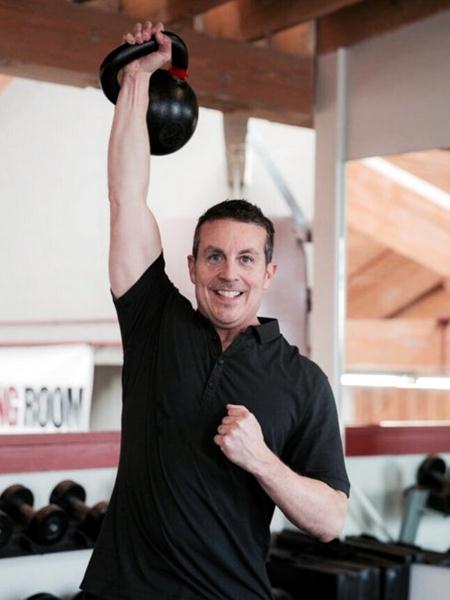
Dragon Door: When did you first get involved with athletics and fitness?
Chris Quesada: As a kid, I played football, then really got into wrestling in junior high. I wrestled all through high school and in my first year of college at Fresno State. Wrestling in high school was tough and I was pretty good, but college wrestling was at a whole different level. So, I worked out extra hard and ate properly to maintain my weight. We did some crazy 1980s things that were kind of unhealthy, but we had a good time, and I was in some of the best shape of my life. I've been an athlete most of my life and have been really passionate about lifting weights for a long time.
I have always been interested in learning correct form, technique, and trying not to hurt myself. I got my NSCA personal trainer certification fifteen years ago. Then I started to do more heavy lifting with my clients, and training more high school football, wrestling, and basketball athletes.
Dragon Door: How did you become interested in kettlebell training?
Chris Quesada: In about 2002, my friend, Brian (who I worked out with) mentioned a kettlebell course in Los Angeles led by this "crazy Russian guy" named Pavel. Neither of us even knew what a kettlebell was, but we went down there and got our asses handed to us—and we were both in pretty good shape! I was lifting heavy and running, but we were crying during this session! We watched Pavel and his assistants lift very heavy kettlebells overhead and couldn’t believe it. Afterwards, I had to know more—even though I couldn’t walk for two weeks. I used a
12kg kettlebell and trained the basics for a long time before I was finally confident with my technique. Then, I went for my
Hardstyle Kettlebell Certification (HKC). While I still had a lot to learn, I was confident to teach my clients the kettlebell fundamentals.
My buddy, Frankie, is an
RKC-II and said I need to go for my RKC certification. He showed me what to do and how to prepare for the testing, and I started to do it. I was about halfway into training for the RKC when I got really sick. At first I thought I was overtraining, and had gotten a really bad cold. I got over it, started training, and then I got sick again! Again, I thought maybe I was training too hard or my immune system was down. I wasn’t doing anything unusual other than a lot of volume. Then, I got the worst sore throat of my life—and I have a pretty high threshold of pain.
When I went to the doctor, they said something was going on with my throat and sent me to an ear, nose, and throat doctor who put a scope down my nose to look into my throat. They found a really gnarly abscess and needed to do a biopsy. After the biopsy, I went home, my wife went to work, I took the kids to school, then came back home to relax.
My ear nose and throat doctor called with the results from the biopsy. It was cancer.
This was a very difficult emotional step for me because nothing like this had ever happened to me, and was suddenly hearing the big "c-word". I was scared, though I was more scared for my wife. But, we rallied together and she carried me through my whole treatment—along with her kids, her family and my family.
It was a pretty dark time of my life. I went from a solid, muscular 160lb down to only 120lb towards the end. My neighbors didn't recognize me but because I wrestled at 114lb my freshman year in high school at the same height(5’8") I knew my body could handle being at a low weight. Once I was through treatment, my throat was so raw from the radiation that I couldn't even swallow water and needed a feeding tube. Having my independence taken because I was unable to eat was probably the worst part of it all. Food was never a big deal until I couldn’t have it. Even water—I remember having dreams about drinking water.
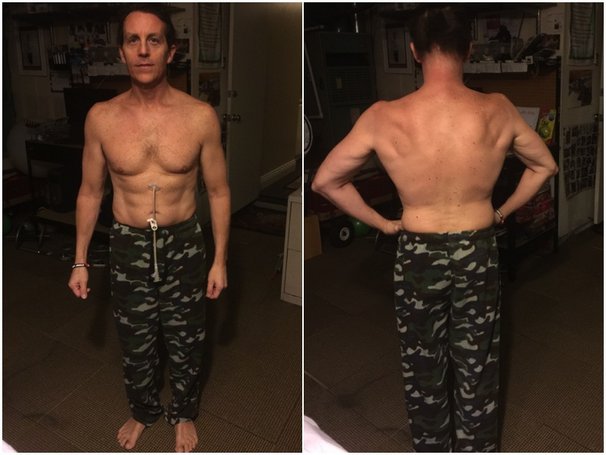
Everything went into the tube. My wife boiled organic vegetables and bone marrow then ground it all up in the blender so it could go down the tube. That’s how I ate for five months—sometimes I would put water in my mouth and rinse it around, but would have to spit it out because it was far too painful to swallow. Once the pain started to subside, I had to learn how to eat all over again. A speech therapist gave me specific exercises to do since the muscles in my throat had atrophied so much that I could not swallow yet. It seemed like I would never be able to eat again. But I practiced.
Even though we were forcing very high calorie shakes down the tube, I wasn't gaining any weight back because I couldn't eat. Depression and anxiety soon followed and I was on medication for anxiety and nausea—which was also making eating more difficult.
Once I was finally able to eat again, it was like Christmas. My wife made me amazing 1,500 calorie shakes three times a day with Nutella, almond butter, protein powder—anything high calorie and organic. Sure enough, I started to gain some weight back, but I was still week from not exercising for about five months. I had only been walking, as recommended by my doctor. After starting with walking a few feet I was eventually able to walk to the beach from my apartment—about two miles.
For about three months, all I did was walk before I could finally start working with some very tiny yellow rubber-coated kettlebells in December. I wanted to get the basic feel for it again. The muscle memory was still there and everything began to come back to me slowly. I had been reading
Enter The Kettlebell and
Easy Strength while I was sick, so I would have a plan for getting my strength back. Little by little I was able to get to 155lb, and now, I think I look better than I did at 165lb before treatment!
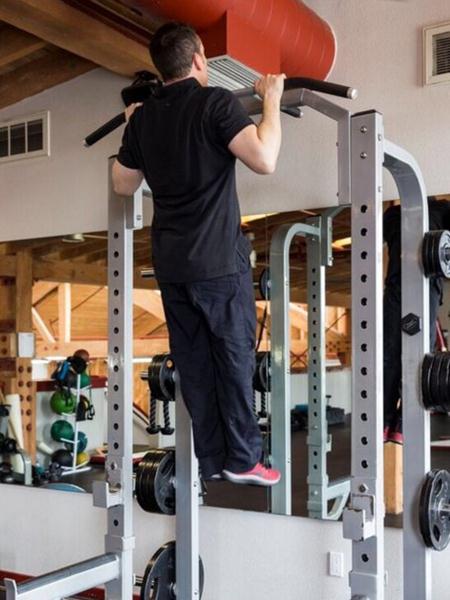
My strength is back at about 90%, but I still feel good about it since I used to think I would need to be heavier to lift the big weights. Now I know that following the right steps and using correct technique are the real requirements.
Eventually, I learned to step back even further within the basics. Now I really appreciate teaching the first steps to my beginner clients, because those were the same first steps that worked for me, too. Normally, I like to jump into things at full steam and not at square one, but square one is where you must start, if you want to get your strength back really fast. If I had jumped in to the middle, I would have injured myself, gotten frustrated and definitely would not have made the gains that I have now. Starting from the beginning was helpful mentally and physically.
Dragon Door: It's so important to spend time with the basics, and it sounds like your attention to detail and consistent practice even before getting sick paid off after your recovery.
Chris Quesada: I was a high intensity style strength coach back in the day—it used to be all about a million reps and four to five sets. Unless my client crawled out the door in a puddle of sweat, then I didn’t think they were getting a good workout! Then I saw Frankie, the RKC-II kettlebell guy leading his clients through all these one rep movements with
kettlebells, and I didn’t think that was even working out! But, I ended up doing so many one rep presses and pull-ups to get where I am now. It definitely brought my strength back fast.
Kettlebell get-up, seven months post-cancer.
Dragon Door: How long have you been back at work and working out?
Chris Quesada: I finished my last round of radiation and chemo on 6/23/15. At first, my exercise was walking only. Sometimes I was so weak I only made it half way around the block. I lived upstairs in my apartment, and often wondered how I made it up those stairs!
By December, I was swinging kettlebells again. I started with a little yellow
8kg kettlebell and did all my getups, swings, and overhead presses with it—it was very hard at first. But I stayed with it and now I can do two hand swings with the
40kg kettlebell and am working with double 24kg kettlebells—swings, cleans, front squats, overhead presses. I had been using
24kg before my treatment and am back to using them again. When I first came back to work, my boss didn’t even recognize me because I was so skinny, but three months later, I was back!
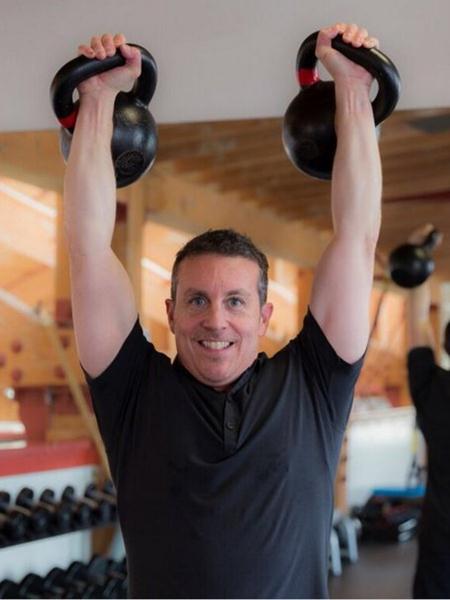
Dragon Door: That’s not very long at all!
Chris Quesada: The guy I saw in the mirror a few months ago is not the guy who I see in the mirror now! It took a lot of determination, will, and desire to get back to square one again. Now, when my clients tell me they can’t do something, I know they can, and now they believe me because they know what I’ve been through! They also know I would never have them do anything that’s unsafe. Unfortunately, many trainers out there put their clients at risk every single day. Since I am working in a sports medicine facility (we’re training on one side of the room, and the other side is for pain patients—back, shoulder, neck) we see many people who have gotten injured because their trainers had them do something dangerous.
There are a lot good trainers out there and I try to learn from them, but many trainers who need a lot more education. I am one of the most versatile
trainers in the gym, and so much more well-rounded now than I was ten years ago. I’m always learning and have taken a ton of Perform Better courses, IDEA courses, the HKC, and now I want to go to the next level—the
RKC.
Dragon Door: You mentioned using swings, getups, presses to get stronger after your treatment, was there a particular move you felt was especially pivotal for regaining your strength?
Chris Quesada: The get-up was probably the hardest one because I lost so much muscle and flexibility. At first it was very difficult to pack my shoulder with the weight overhead. I had to do planks for days to activate my glutes. I would hang from a pull-up bar to try to get my shoulders moving. I did so much before I even tried to pick up a kettlebell—planks, hip bridges, exercises to get my hip flexors and psoas connected and firing a little more, and everything I could do to get my glutes and hamstrings working again.
My wife was joking around with me and said that I had had a really nice butt, but, "That cancer ate your ass away! Your butt is gone! That was one of your best attributes!" Now that I've gotten back to deadlifts, swings, and goblets squats, I have my butt back! All those exercises and movement patterns also really strengthen the parts of your legs that help protect the back. Now, the big giant kettlebells are almost easy to swing because I know how to engage everything—how to keep my abs tight, and fire my glutes. My strength has increased so quickly, but my weight is barely climbing, I didn’t think I could do the lifts I’m doing now without being heavier.
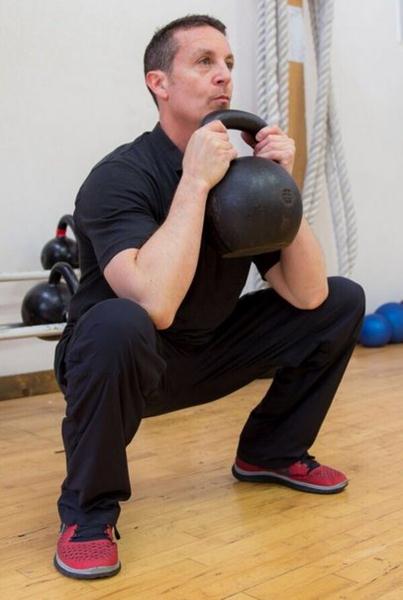
To learn to pack my shoulders again, I also did a lot of farmer’s walks, rack walks, and suitcase carries. I did cleans all day long with the
16kg and 12kg kettlebells—just 3-4 reps, then I’d walk around to rest for 5 minutes. I repeated this for hours. When I first came back to the gym, I wasn’t working a lot, so I would work out for up to two hours but with very low reps such as 10 sets of 4 reps.
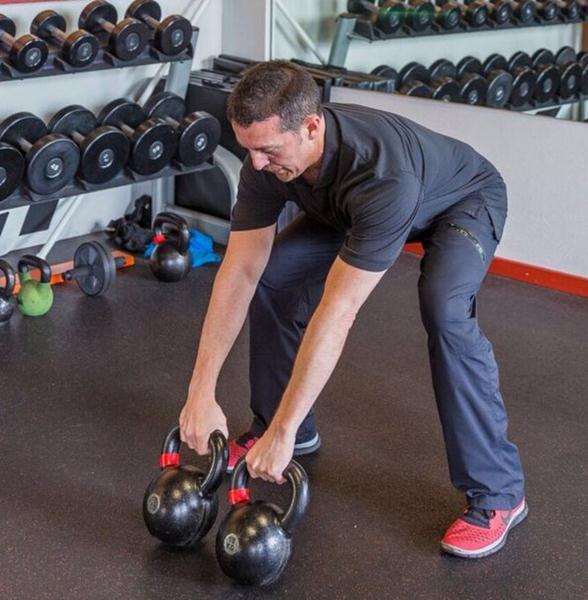
Dragon Door: What is your next goal?
Chris Quesada: Since I am so close to regaining my strength from before treatment, I’m going to try and train for the next nearby certification. I want to go to the next level and have the
Master RKCs tell me what I need to work and focus on—and what to fix. Having someone tell me what I need to improve motivates me to perfect my technique.
Dragon Door: Its so important for us as instructors to be focused on our technique. If we have hesitation or extra movements it can confuse our clients very easily.
Chris Quesada: If I hadn't taken the time to go from zero to where I am now with all the steps—the same way I teach my beginner clients—then I wouldn’t already be back to the strength I had before treatment. It has been an incredible experience. When I was as feeling as bad as I was during treatment, I never thought I could get back to the strength I had before. My wife told me to stop thinking like that and said that I would be stronger than before—and she was right!
Back